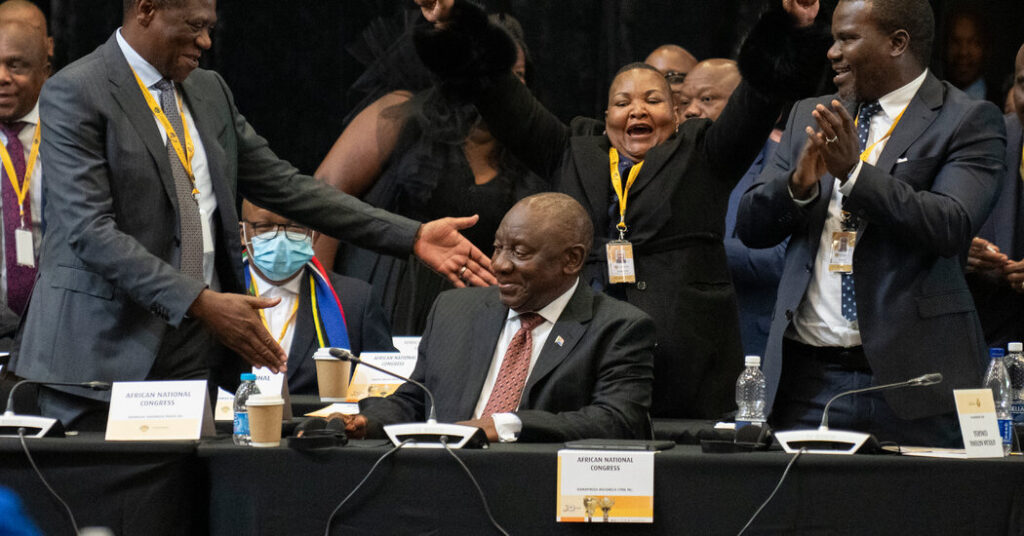South African President Cyril Ramaphosa is due to be sworn in for a second term on Wednesday, setting up a government unlike any the country has experienced since the end of apartheid in 1994.
Ramaphosa’s African National Congress (ANC) will partner with a rival party to govern for the first time after it failed to win an outright majority in last month’s election – receiving just 40% of the vote.
Mr Ramaphosa is championing a new era of unity and collaboration. Not everyone is sold.
The partnership includes the second largest party, the Democratic Alliance, which received 22% of the vote and has long positioned itself as the ANC’s fiercest critic. The other three parties that joined the coalition each won less than 4% of the vote: Inkatha Freedom Party, Patriotic Union and GOOD.
The five coalition partners signed a statement of basic principles – dubbed a “government of national unity” by all parties – including their policy priorities. But the document did not mention specific details.
How will they boost the sluggish economy? Will they continue to pursue affirmative action policies that are strongly supported by the ANC but strongly opposed by the Democratic Alliance? What about the controversial issue of racial disparities in land ownership?
Here are four challenges South Africa’s new government will face.
A rough start could threaten the future.
There are already signs that tensions could cause trouble in future relationships.
Ryan Coetzee, a former DA strategist who was involved in coalition negotiations, wrote in a column for South African news website News24 that the African National Congress, which is nearing the final stages of the deal-making process, appears to be rejecting the idea. : Power must be shared with the Democratic Alliance.
“There can be no doubt that its aim was to weaken the Democratic Alliance,” Coetzee wrote of the ANC. “This was a mistake because it would turn government into a permanent battleground, thereby threatening it from the outset. to its existence.
Ramaphosa will soon have to form his cabinet, taking ministerial posts from other parties into consideration. From that point on, the hard work of putting aside personal and ideological complaints began.
“I don’t think it will be an easy marriage,” said Thelela Ngcetane-Vika, a lecturer in international law and public policy at the School of Governance at the University of the Witwatersrand in Johannesburg.
With the economy so bad, solutions will be hard to find.
The core of South Africans’ dissatisfaction with the government is the sluggish economy, high unemployment, high inequality, and severe poverty.
Mr Ramaphosa’s former economic adviser Trudy Mahaya said the coalition government’s economic approach was likely to be very similar to that of the previous ANC-led government, which had largely adopted centrist policies. “I think the narrative and the rhetoric will change, but the substance won’t,” she said.
Mr Mahaya said Mr Ramaphosa, for example, had embraced greater private sector involvement in creating jobs and stimulating the economy, but the new government’s messaging was likely to emphasize this more given the Democratic Alliance’s free-market stance.
The Democratic Alliance has called for the continuation of Operation Ulindela, an initiative launched by Mr Ramaphosa to strengthen critical infrastructure, some of which is through privatization. Ms Mahaya said the DA could also push the government to speed up regulatory cuts to drive more investment in the country.
The partners had very different views on race.
The topic expected to cause the most friction between the ANC and DA is how to address lingering racial disparities.
Many in the ANC are staunchly opposed to the coalition government, arguing that the DA denies the existence of racism and wants to maintain the status quo of a white-dominated economy. Democratic Alliance officials denied the claims.
“We believe that transformation means increasing efficiency, improving infrastructure and making the country work,” said Helen Zille, chair of the Democratic Union’s federal council, explaining the party’s approach to promoting historically disadvantaged ethnic groups. .
During the campaign, the Democratic Alliance proposed scrapping black economic empowerment, one of the ANC’s signature measures aimed at incentivizing black ownership and leadership of companies. Because of the law’s importance to the ANC and its base, Ms Mahaya said she could foresee the DA pushing for reforms that might keep the law in place but make it more acceptable to its supporters.
One of the most controversial representations of broader racial disparities is the fact that most of the country’s land is still owned by whites. While left-wing politicians – including many within the ANC – have called on the government to seize land from white owners without compensation, this position runs counter to the Democratic Alliance’s economic philosophy.
The ANC has largely adopted a centrist land policy and is therefore unlikely to propose any radical proposals. But Ms Mahaya said the ANC could do a better job of implementing existing measures – such as handing unused state land to private individuals – to make some progress on land reform.
Alliance factions approach foreign policy in different ways.
The ANC has actively leaned toward a foreign policy that opposes some Western interests, most notably accusing Israel of genocide in Gaza before international courts and refusing to condemn Russia’s invasion of Ukraine.
The Democratic Alliance tends to be more supportive of South Africa’s Western allies, such as the United States and the European Union, which have the largest trading relations with South Africa.
Lebogang Legodi, a senior lecturer in politics and international relations at the University of Limpopo in South Africa, said that when it comes to foreign policy, “you see a lot of debate but not a lot of common ground.”
Ramaphosa nonetheless maintains friendly relations with Western powers and their allies such as China and Russia. Major tensions with the DA are likely to arise over disputes over South Africa’s role in global institutions such as the BRICS, a multinational grouping that competes with the West and which recently welcomed Iran as one of its new members.

